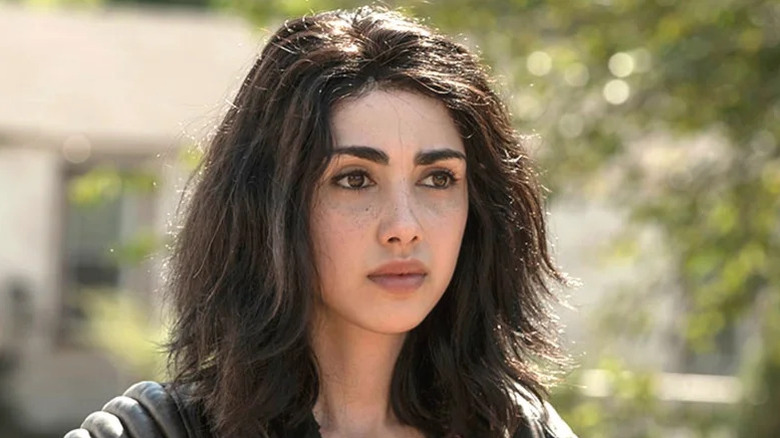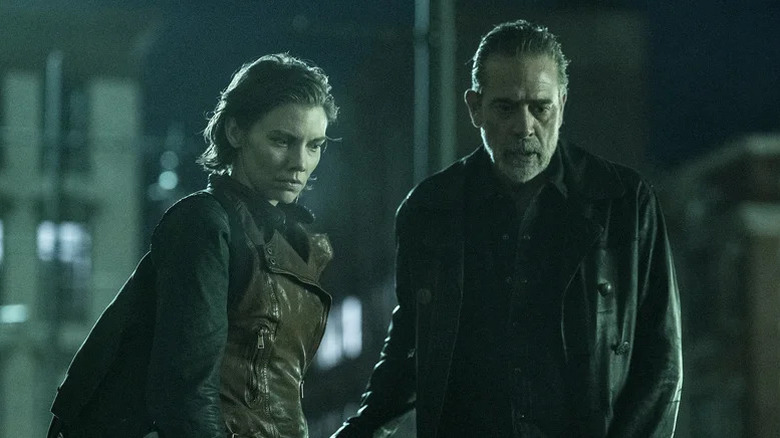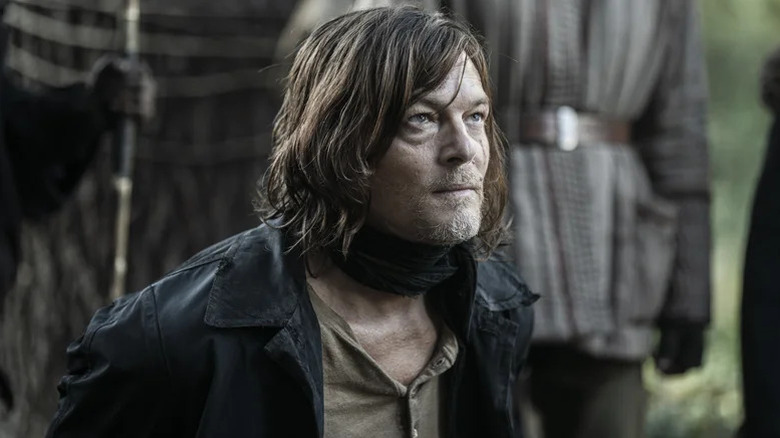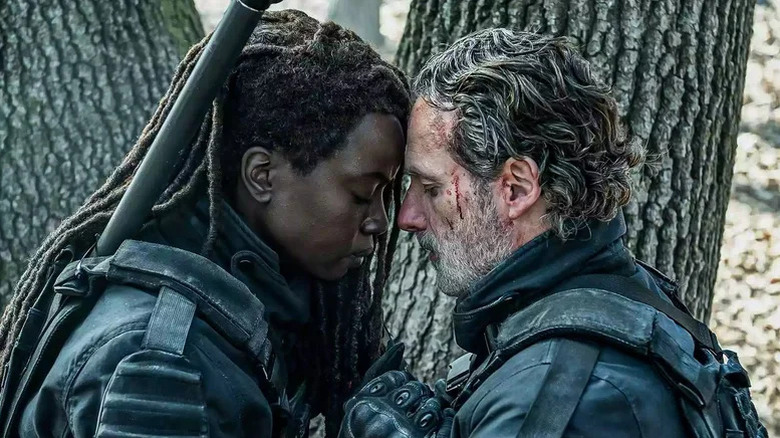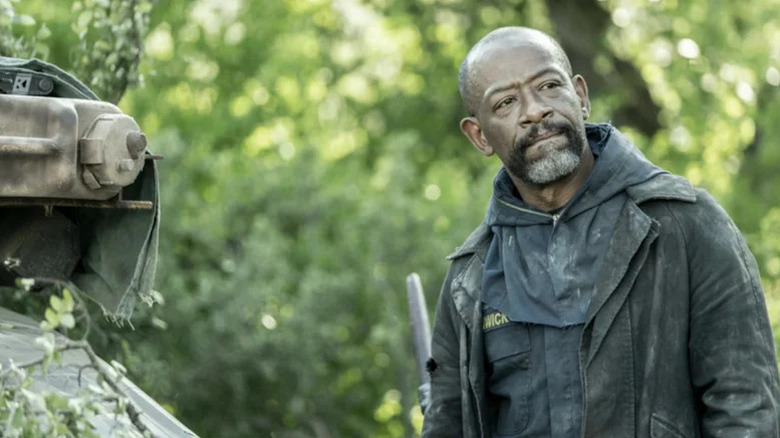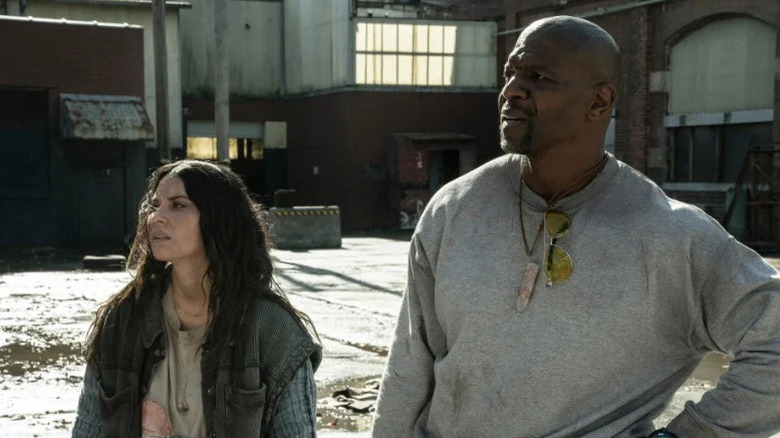Every Spin-Off Of The Walking Dead, Ranked
Over the course of its 11 seasons, "The Walking Dead" offered plenty of post-apocalyptic drama for viewers. However, this was only the beginning. Any popular series worth its salt can expect a spin-off or two, but "The Walking Dead" seems to have decided to stay true to its title by spawning a massive horde that will shamble on long after the original show's death and burial. Combine its copious spin-off shows with writer Robert Kirkman's original "The Walking Dead" comics and other material like the Telltale video game series, and the post-apocalyptic property is a bona fide multimedia franchise with so much material that even the most dedicated fan may find it hard to go through it all.
As such, it's understandable if fans of "The Walking Dead" want to pick their battles by only watching the shows that truly interest them. To help you on this quest, I've compiled this handy ranking of the spin-off series. Hopefully, it will help you to form an idea of which shows should absolutely be on your watch list and which you can happily put on the back burner.
6. The Walking Dead: World Beyond
"The Walking Dead: World Beyond" was always intended to last for two seasons. On paper, this should've benefitted the show and given it a chance to craft a tight arc devoid of fluff. This is part of why the second "The Walking Dead" spin-off is so disappointing. Disliked by critics and audiences alike, Scott M. Gimple's YA-tinted take on the post-apocalypse has its moments, but it lacks much of the dramatic impact pretty much all other "The Walking Dead" series have in abundance. Set a decade after the events of "The Walking Dead" season 1, the main characters are teens who have grown up since the not-zombie apocalypse began, which puts them in the same box with just about any other franchise that focuses on plucky kids navigating a rotten post-apocalypse and its dangers — and tell a far less compelling story than many other representatives of the genre.
There are great moments here, for sure, and the show's contributions to world-building make it a must-see among "The Walking Dead" completionists. However, the series' failure to avoid the aforementioned filler often makes it arduous and even boring, which is something a self-proclaimed horror drama that features an undead threat should never, ever be.
5. The Walking Dead: Dead City
Few "The Walking Dead" characters have a wilder arc than Jeffrey Dean Morgan's Negan. He enters the show as the leader of the villainous Saviors faction, killing major characters Abraham (Michael Cudlitz) and Glenn (Steven Yeun). After being defeated, he begins a lengthy redemption arc in season 9, slowly gaining the protagonists' trust in spite of his problematic history and recurring attitude problem. As Negan's survival and protagonist turn despite his array of heinous deeds prove, he benefits from particularly sturdy plot armor on a series that has killed antagonists off for much less — and nothing illustrates this better than his constant failure to get killed by Maggie (Lauren Cohan), Glenn's understandably hostile and vengeful widow.
Negan and Maggie managed to more or less bury the hatchet on the parent show, but the tension is back on "The Walking Dead: Dead City," where the two team up to save her son Hershel (Logan Kim) from the Croat (Željko Ivanek), a former Savior whose forces preside over Manhattan. Along with taking the franchise's signature action to the Big Apple, the show series the volatile relationship between its main characters for all it's worth. In doing so, it effectively reboots and remixes the pair's arc from the parent show, only in a new setting and with a mission that's highly personal to both. As such, "Dead City" is a fun enough series and a decent (if slightly illogical) way to keep the property alive, but it doesn't really offer anything new to fans.
4. The Walking Dead: Daryl Dixon
"The Walking Dead: Daryl Dixon" (or "The Walking Dead: Daryl Dixon — The Book of Carol," as season 2 is confusingly called) is based on your classic "take a popular character and put them in a strange locale" trope. This "Jason X" of "The Walking Dead" franchise drops the titular heroic hillbilly (Norman Reedus) in France to clash with the local post-apocalyptic culture while figuring out how he got there.
Immediately, it's clear that we're not in the proverbial Kansas anymore. There's an outlandish new walker type with acid blood. There's a very French religious sect that believes in the coming of a messianic figure who will help vanquish the walkers and rebuild the world. There's even a big action scene in the bone-filled Paris Catacombs. As it turns out, the leader of the villainous Pouvoir Du Vivant faction, Genet (Anne Charrier), used to work in the Louvre.
You get the drill. This is not a subtle show, and it really, really wants you to know that its events take place in France. Luckily, Reedus is his reliably charming and scruffy self, and the cinematography offers loving looks at the beautiful French natural landscapes and architecture, which make "The Walking Dead: Daryl Dixon" arguably the most gorgeous series in the entire property. Daryl's friend Carol Peletier (Melissa McBride) joining him in France for season 2 also brings a whole new flavor in the proceedings. Still, all in all, the show's battle axe fights and vague low fantasy vibe can come across as strange to fans who are used to the parent show's rustic and grimy Americana, and the series still has a long way to go before it shines with the brightest stars of the franchise.
3. The Walking Dead: The Ones Who Live
"The Walking Dead: The Ones Who Live" focuses on two of the most iconic characters in the franchise — Rick Grimes (Andrew Lincoln) and Michonne (Danai Gurira) — and their quest to reunite some five years after the end of "The Walking Dead." It lets fans finally know what on Earth has been going on in Rick's life since Lincoln's character left "The Walking Dead" after nine seasons in a Civic Republic Military helicopter. It even finally reveals the shadowy eminence behind the CRM — Major General Beale, played by none other than Terry O'Quinn of "Lost" fame.
Perhaps most importantly, however, "The Ones Who Live" doesn't overstay its welcome. As a miniseries with just six episodes to its name, the show follows a clear narrative: Bring Rick and Michonne back together and have them kick the ever-loving bejeezus out of the CRM and its sinister strategies.
Technically speaking, "The Walking Dead: The Ones Who Live" should be underwhelming since it's the comparatively mundane end result of the most hubris-filled project in the franchise's history: a planned trilogy of "The Walking Dead" films starring Lincoln. For a multitude of reasons, the "Walking Dead" movies never happened and their intended storyline was repurposed into "The Ones Who Live." Fortunately, this strange origin story ultimately served the whole. The show's scope and stakes are extremely cinematic, but it still retains the franchise's small screen heart and gives its audience some much-needed closure on the long-unresolved Rick and Michonne storyline.
2. Fear the Walking Dead
Out of all the spin-offs, "Fear the Walking Dead" is the most adept at capturing the parent show's atmosphere. "Fear," interestingly, is also two series in one. For the first three seasons, it's a prequel show that depicts the beginning and extremely early stages of the Wildfire virus outbreak that caused the franchise's take on the zombie apocalypse, with Madison Clark (Kim Dickens) and her family-group of survivors serving as the focal point. However, come season 4, the show suddenly jumps to the same timeline as "The Walking Dead" and brings in Morgan Jones (Lennie James) from the original series as the new de facto main character.
The first three seasons of "Fear the Walking Dead" run just fine on prequel fuel, and they're not exactly shy of fascinating characters like Colman Domingo's morally flexible Victor Strand. However, the time skip and the arrival of Morgan are what really kicks the show into high gear. Apart from breathing new life to existing characters and introducing new storylines, it's good to see James' long-suffering character in such a prominent role, and his pacifistic warrior monk attitude adds greatly to the series' allure. All in all, it's no surprise that the eight-season "Fear the Walking Dead" soldiered on to become the longest-running "The Walking Dead" spin-off.
1. Tales of the Walking Dead
For fans who like the world of "The Walking Dead" but don't enjoy the frankly meandering pace the show often proceeds at, "Tales of the Walking Dead" is a must-see. The 2022 anthology series focuses almost entirely on standalone stories — the sole exception is a pretty great origin story for Samantha Morton's "The Walking Dead" villain Alpha. This allows "Tales of the Walking Dead" to explore some truly unforeseen corners of the franchise, using truly unique premises and casting major names as characters whose safety is nowhere close to guaranteed.
This is how we get episodes like "Amy/Dr. Everett," in which Dr. Everett (Anthony Edwards of "ER" fame in a fun piece of stunt casting) observes a group of undead closed within a zombie-proofed area ... or "Evie/Joe," a moody road trip starring Terry Crews and Olivia Munn. The show also likes to tease paranormal aspects, happily incorporating ideas like time loops and vengeful ghosts in its usual zombie fare.
Though "Tales of the Walking Dead" only has six episodes to its name, all six are quality offerings that both examine and play with the franchise's lore. The end result is so effective that the show's sole major sin is its shortness. Fortunately, "The Walking Dead" creative director Scott M. Gimple wants to revive the spin-off, so there's a chance that more strangeness is on the way.

